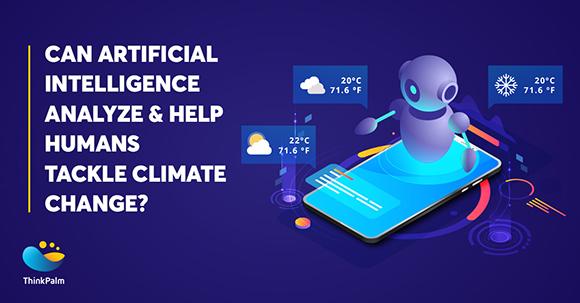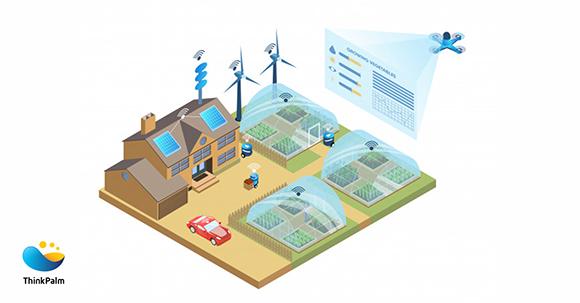Artificial Intelligence is enhancing the way we live and work, it has improved our healthcare, workforce and daily activities; but what can it do for our climate?

The dawn of AI in recent years has challenged several philanthropists to ask how can this revolutionary technology help with the greatest threat humanity faces: Climate Change.
Just a few weeks back, Noble Prize nominee Greta Thunberg from Sweden made an earnest and emotionally charged speech at the United Nations, urging world leaders to step up their responsibility to protect the future of our planet. The global climate change has already had its toll on the environment. Glaciers have shrunk, ice on lakes & rivers are breaking, animal and plant ranges have shifted. The Earth’s soaring temperatures are kindling prolonged and hotter heat waves, persistent droughts, heavier rainfall, and increasingly powerful hurricanes.
How Artificial Intelligence (AI) Can Help Tackle Climate Change
Nowadays, we mostly hear about how Artificial Intelligence has helped in industry automation, customer satisfaction, increasing business revenue and much more, but rather than transforming economies; how can technology improve our environment?
While there are still some who profess climate change is a farce, the majority believe we require to utilize everything we need to stop the mass extinction, including Artificial intelligence.
It is a significant part of a comprehensive debate among the top nations about how to utilize AI for the benefit of human beings, the challenges that technology poses and how to tackle them. By implementing AI in climatic well-being, it will help not only to subdue the causes of pollution but also assist us to adapt to these climate changes.
Using Artificial Intelligence, analysts can foretell the precise status of climate change, which will support devise a more reliable climate model. Certain foresight can be adopted to recognize our exposure to vulnerabilities and environmental hazards, thus aiding us to react in a better way to the effects of climate change.
Although artificial intelligence is not the only perfect solution to tackle climate change, it is initiating an innovative perspective into the current dilemma.
Reduce Carbon Emission By Making Smarter Vehicles 
The vehicle sector estimates for a fraction of all global energy-related carbon dioxide emissions, with two-thirds of this produced by road users. Smart autonomous vehicles have been reducing their reliance on fossil fuels and increasing their renewable energy production. With the driver able to monitor emissions and are also quieter than average vehicles, it confirms that smart vehicles are indeed the vehicle of the future.
The application of Artificial intelligence in the transportation sector could make efficient use of vehicles implemented with IoT, thus reducing the number of wasted journeys, increasing vehicle performance, and helping in efficient freight management.
Artificial Intelligence Can Predict Extreme Weather Conditions

Researchers have developed an artificial intelligence system that promises improvements in weather forecasting by more efficiently mining data in forecasting models.
When forecasting weather, scientists use several models and data sources to determine patterns and movements of clouds that could initiate severe storms. However, with frequently increasing weather data sets, it is almost impossible for them to monitor all storm formations, therefore with the implementation of AI, they identify possible severe storms instantly and precisely. Modeling these patterns will help scientists predict intense weather conditions, like hurricanes and droughts, which in turn will help governments take necessary precautions against the worst climatic conditions.
Artificial Intelligence Can Make Buildings Smarter

With the advancements in technologies like IoT and Artificial Intelligence, it is feasible to digitize homes or offices and make everyday devices smarter. An AI-powered building automation can reduce energy consumption and carbon footprints by monitoring smart thermostats and automated sensors.
The efficiency of remote connectivity and access through smart meters track electricity consumption and send information to users. The users can monitor electricity remotely when appliances are not in use and cut off the energy to save electricity.
Artificial Intelligence could help by forecasting electricity generation and demand, enabling suppliers to completely integrate renewable resources into national grids and reduce wastage of energy.
Some Other Uses Of Artifical Intelligence To Tackle Climate Change

Artificial Intelligence can assist in monitoring wildlife and ecosystems; collecting required data about their interactions.
Its innovative high-speed processing can contribute real-time satellite data to track forest fires, hunting or illegal logging in forests. AI has also been used in agriculture nowadays, it can monitor water quality and predict when plants or crops need maintenance.
As climate change’s outcomes progress to compel prompt action, corporations have started to adopt Artificial Intelligence and machine learning to help operate data and improve decision making.
The convergence of these technologies presents a critical novel opportunity for humanity to build a sustainable trail forward.
Author

Ricky : is a content strategist, who has an unparalleled dedication to building productive and engaging website content that attracts traffic and increase search engine rankings. If not typing furiously on his keyboard, Ricky is constantly learning ways to enhance search traffic acquisitions



